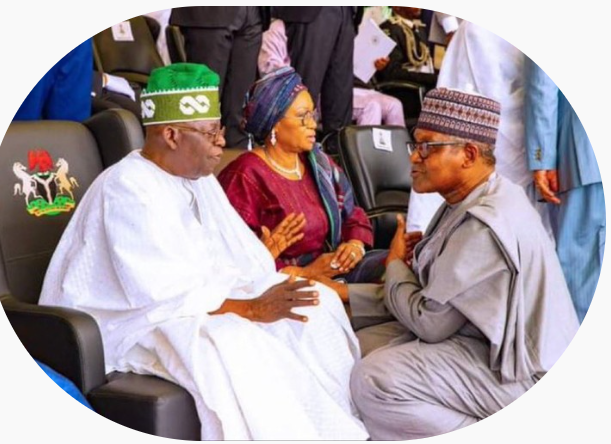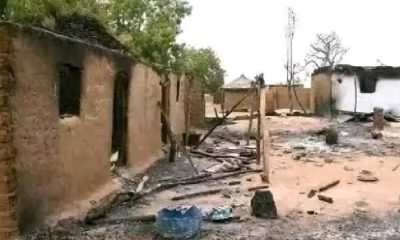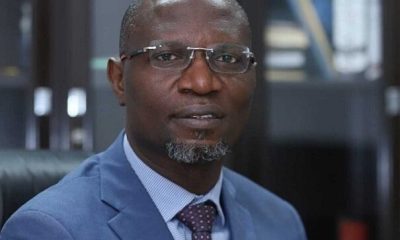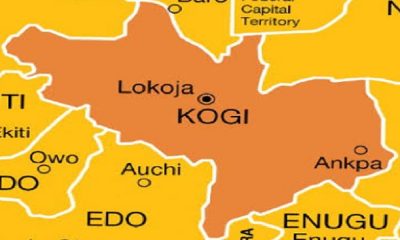News
End Fuel Subsidies Now, to enable economy flourish-Dangote yells FG

By Kayode Sanni-Arewa
The President and Chief Executive of Dangote Group, Alhaji Aliko Dangote, has called on the Federal Government to end fuel subsidies completely.
He said the removal would help determine the actual petrol consumption in the country, as he confirmed ownership of two oil blocks in the upstream sector with an expected production date of next month.
Dangote also stated that fuel production from his $20bn mega refinery in Lagos will help ease pressures on the naira. The refinery can refine 650,000 barrels of crude oil daily.
Speaking in a 26-minute interview with Bloomberg Television in New York on Monday, monitored by our correspondent, Dangote said now is the right time to end fuel subsidies.
Africa’s wealthiest man further noted that ending petrol imports will have a huge upside in easing currency pressures.
He said, “Subsidy is a very sensitive issue. Once you are subsidising something then people will bloat the price and then the government will end up paying what they are not supposed to be paying. It is the right time to get rid of subsidies.”
“But this refinery will resolve a lot of issues out there, you know, it will show the real consumption of Nigeria, because, you know, nobody can tell you. Some people say 60 million litres of gasoline per day.
“Some say, it’s less. But right now, if you look at it by us producing, everything can be counted. So everything can be accounted for, particularly for most of the trucks or ships that will come to load from us. We are going to put a tracker on them to be sure they are going to take the oil within Nigeria, and that, I think, can help the government save quite a lot of money. I think it is the right time, you know, to remove the subsidy.”
Dangote who recalled the challenges faced after the project’s launch in 2013, experiencing a five-year delay due to issues with state government and host communities and a running loan of $2.4bn, said he is personally proud to achieve the feat.
On whether the subsidy will make the refinery viable, Dangote said, “Well, you see, we have a choice of either one. We produce, we export, and when we produce, we sell locally. But we are a big private company. And yes, it’s true, we have to make a profit. We build something worth $20bn so definitely we have to make money.
“The removal of subsidies is totally dependent on the government, not on us. We cannot change the price, but I think the government will have to give up something for something. So I think at the end of the day, this subsidy will have to go.”
President Bola Tinubu removed the subsidy when he took office in May 2023, exacerbating a cost-of-living crisis that sparked protests, but quickly reinstated it as inflation spiked.
Another step to ending it was taken in early September when the gasoline cap was eased — though the price remains below the market level.
Nigeria, until Dangote’s refinery came on stream was fully dependent on imported petroleum products, and has been taking tentative moves to finally end the nation’s pricey fuel subsidies, which in 2022 cost $10bn.
Dangote, who has the option of either exporting his fuel or selling it domestically, said the decision on subsidies was the government’s, but added that ending gasoline imports will have a huge upside in easing currency pressures.
The naira has lost around 70 per cent of its value against the dollar since rules that pegged the currency at an artificially high level were relaxed last year.
But the scarcity of the greenback in the Nigerian foreign exchange market continues to weigh on the naira and is made worse by the need to pay for imported gasoline in dollars.
Petroleum products consume about 40 per cent of our foreign exchange,” Dangote said, adding that fuel from his refinery, which started supplying gasoline on Sept. 15 to the state-owned oil company for domestic sale, “can actually stabilize the naira.”
Continuing in the interview, the businessman revealed the details of the pricing disagreement that occurred with the Nigerian National Petroleum Company Limited.
He said the national oil company bought its current stock from the refinery at a cheaper price than its imported fuel but gave a uniform price for all products.
“There wasn’t really a disagreement, per se. NNPC bought from us on the 15th of September at the international price, which they also bought, about 800,000 metric tons of gasoline imported. So the one that they bought from us actually is cheaper than the one they are importing.
“And so when they announced our price, the guy, I don’t know whether he was authorized. It wasn’t really the real price. What they have announced is most likely that is what it cost them, including profit and other expenses.
“And then the other one is one that they imported. But the people don’t know how much they spend in terms of imports, but their importation is almost, maybe about 15 per cent more expensive than ours, you know.
“So what they are supposed to do is to sell at a basket price, or if they want to remove subsidy, they can announce that they will remove subsidy, which is okay, everybody you know will adjust it.”
On the planned crude oil sales anticipated to begin in October, Dangote said that discussions are still ongoing and a detailed agreement will be finalised this week.
Revealing details of the deal, he explained, “We will sell the crude in naira after we have bought in naira. So now we are currently working out with the committee that the exchange rate is going to be priced. It is going to be normal pricing, you know, if crude is at $80, we will pay that price at an agreed exchange rate.
“And then we will also sell in the domestic market. What that will do is that it’s going to remove 40 per cent pressure on the naira. So because, see, the petroleum products consume about 40 per cent of foreign exchange, so you know, and then, you know, it’s like you have 40 per cent of demand been taken out so that can actually stabilize the naira and even if they subsidise, they would know what they are paying for.
“The deal is to give the government something that they want. It’s also a win-win situation for all and it would benefit the country.
“Currently, discussions are still ongoing to determine the details of the agreement. They are working out something that I think would be a win-win between us and the NNPCL.
“The agreement is very robust. Well, first of all, we would have energy security where they will give us crude. For example, in October, they’re going to give us 12 million barrels, which is on average, about 390,000 barrels a day, which will sell both gasoline, diesel, and aviation fuel.”
He also confirmed ownership of two oil blocks in the upstream sector with an expected production date of next month.
Dangote tankers’ park
Meanwhile, the Federal Government has said that it is providing land for interested entities to build an expansive park for tankers lifting petrol and other products from the Dangote refinery.
This followed a routine inspection on Sunday by the Minister of Works, Dave Umahi, who raised concerns about over 3,000 fuel tankers queueing up on the new concrete pavement road.
Umahi noted that though the pavement is made of concrete the current road was not designed to handle static load and may soon deteriorate like the ever-busy Apapa road.
This minister revealed this to State House Correspondents after Monday’s Federal Executive Council meeting at the Aso Rock Villa, Abuja.
He said, “From my inspection yesterday, we discovered that we had over 3,000 fuel trucks queuing for the Dangote fuel lifting, and they were all parked on the newly constructed road.
“Technically and by design, the roads were never built for static loads. And so it has a lot of effects. So, we will have the same thing we had in Apapa that damaged the entire road until it was constructed on concrete.”
“So what FEC approved today is that the land that we have, the Federal Government land, we should put it for concession so that concessionaires would bid and whoever wins will be able to build a park. The park will be tolled so all those trucks can safely park there. And the pavement of such a park is quite different from the pavement of the road.”
Umahi also announced that the council approved various road projects. He said, “The council approved several road projects. One is a new contract for rehabilitating Maraban-Kankara-Funtua Road in Katsina state. The second is the award of a contract for the construction of a 258km three-lane carriageway, a component of the 1,000 Sokoto-Badagry superhighway section two, phase 2A in the Kebbi Section. It is to be done with continuous reinforced concrete pavement. It excludes all bridges and flyovers.
“The third one is the contract for the construction and dualisation of Afikpo-Uturu-Okiwe in Ebony, Abia, and Imo State, Section Two. The next one is the Bodo-Bonny road in Rivers State under Julius Berger. The Federal Executive Council approved an additional N80bn to complete that project, bringing the total cost to N280bn.
“The next is the third mainland bridge. The third mainland Bridge was executed under emergency work. When you have emergency work, you have to get going, measure the work, and send all your measurements and quotations to the BPP. And that’s what we did. So that has been done, and it’s also extended to Falamo and Queens Drive. It also came with solar-powered light. The essence is that all through the length and breadth of the road, the security agencies will be able to check everything happening within the length and breadth of this bridge. And we give response time to respond to any eventuality for 10 minutes. So the contract covers about four security vans and one-speed boat.”
Other contracts include the N158bn contract approved for the Lekki Port service lanes by Dangote Industries, linking Epe to Shagamu-Benin Expressway. The council also approved the N740.79bn Abuja-Kaduna-Zaria-Kano Road re-scoped with solar lighting under a 14-month completion by Julius Berger.
Umahi also named about 14 road projects and bridges affected by floods, including Ado-Ekiti-Afe Babalola in Ekiti State and Lafia-Shendam Road in Plateau State.
News
Celebrity boxing: Speed Darlington wants rematch after losing to Portable

By Kayode Sanni-Arewa
Nigerian singer Speed Darlington is calling for a rematch against Portable after losing to him in a celebrity boxing match.
Speed Darlington was knocked out in the second round, and he’s unhappy about the outcome.
In a video, he claimed Portable didn’t deserve the win and the prize money, saying he had plans to use the money to build a swimming pool for his community in Imo State.
Portable, I want a rematch. E dey pain me say you dey carry all that money dey go. E dey break my heart.
” I want a rematch. It’s so unfair. You have up to two experience before me and you fight. I never enter ring before. I did not come from poverty,” he said.
“You don’t deserve that money. E dey pain me. I want to build swimming pool for my villagers. I need a rematch, Portable”, he said.
According to Speed Darlington, Portable had an unfair advantage due to his experience, accusing him of using supernatural means to win the fight.
He also claimed he suffered a shoulder injury during the match despite not feeling tired.
Speed Darlington, who wants a rematch, said he needs 30 days to prepare better
News
Israel’s remote controlled bulldozers breaking ground in Gaza war

At first glance, there is nothing unusual about the bulky bulldozer turning up soil at a testing site in central Israel, but as it pulled closer it became clear: the driver’s cabin is eerily empty.
This is the Robdozer, a fortified engineering vehicle manned remotely, and in this case operated from a military expo halfway across the globe in Alabama.
Army engineers and military experts say that the Robdozer — the robotic version of Caterpillar’s D9 bulldozer — is the future of automated combat.
The Israeli military has used D9 for years to carry out frontline tasks like trowelling roads for advancing troops, removing rubble and flattening terrain.
But since war in Gaza broke out in October 2023 and later in Lebanon, the Israeli military has increasingly deployed this robotic version in a bid to enhance its field operations and reduce the risks to its troops.
“The idea is to eliminate the person from the cockpit of the dozer,” said Rani, whose team at the state-owned Israel Aerospace Industries developed the Robdozer.
An unmanned D9 bulldozer digs up a field during a demonstration to the press at the Israel Aerospace Industries (IAI) quarters near Tel Aviv on March 26, 2025. Israel’s increasing use of advanced technology on the battlefield, from air defence systems to a broad range of AI-driven intelligence tools, has been well-documented but also criticised for inaccuracies, lack of human oversight and potential violations of international law. (Photo by GIL COHEN-MAGEN / AFP)
During the Gaza war, the military has increasingly opted for the unmanned version, which can carry out a full range of tasks “even better than a human”, said Rani, using his first name only for security reasons.
While such vehicles and other systems are currently operated by humans, future versions could be autonomous, raising ethical and legal concerns over the unchartered future of warfare being shaped by the Israeli military in the Gaza war.
‘Changing the paradigm’
Israel’s increasing use of advanced technology on the battlefield, from air defence systems to a broad range of AI-driven intelligence tools, has been well-documented but also criticised for inaccuracies, lack of human oversight and potential violations of international law.
Analysts say the growing Israeli deployment of the Robdozer reflects broader global trends towards automation in heavy combat vehicles, like remote-controlled personnel carriers that operate much like drones.
An Israeli military official, who requested anonymity to discuss sensitive matters, told AFP that the army has been using “robotic tools for over a decade, but in very small numbers. Now it is being used in large-scale warfare”.
News
70-hour Chess Marathon: Onakoya reportedly breaks record set by Norwegians

Nigerian chess sensation and founder of Chess in Slums Africa, Tunde Onakoya, has broken the chess marathon record of 61 hours, 3 minutes, and 34 seconds, set by two Norwegian players, Hallvard Haug Flatebø and Sjur Ferkingstad, in June 2024.
Onakoya and his chess partner, Shawn Martinez, are currently aiming to complete a 70-hour chess marathon in Times Square, New York.
The marathon, a four-day non-stop gameplay, started on April 17.
In a post shared on X shortly after surpassing the current record, he expressed fulfillment and called for action to educate and create opportunities for street children in Nigeria.
For all the dreamers! We’ve officially BROKEN THE RECORD with my brother,” he wrote.
Although the official confirmation from Guinness World Records is still being awaited, Nigerians and chess lovers from different parts of the world have congratulated the chess master on his latest achievement.
-

 News17 hours ago
News17 hours agoBLACK EASTER: Over 150 massacred in Plateau, Benue
-

 News13 hours ago
News13 hours agoDouble tragedy: Father, three children, maid killed in Osun road crash
-

 News13 hours ago
News13 hours agoSAD! SEC DG says “we can’t recover N1.3trn Nigerians lost to CBEX ponzi scheme”
-

 News11 hours ago
News11 hours agoNDLEA nabs bandits supplier with drugs concealed in private part(Photos)
-

 Metro16 hours ago
Metro16 hours agoShock as 2 naked lovers found dead in Kogi
-

 News17 hours ago
News17 hours agoIMF expresses concern over high poverty rate, food insecurity in Nigeria
-

 Economy17 hours ago
Economy17 hours agoVolvo announces termination of 800 U.S. workers, cites tariff, market decline
-

 News12 hours ago
News12 hours agoNUJ-FCT Chairman Urges Journalists to Embrace Spirit of Easter






